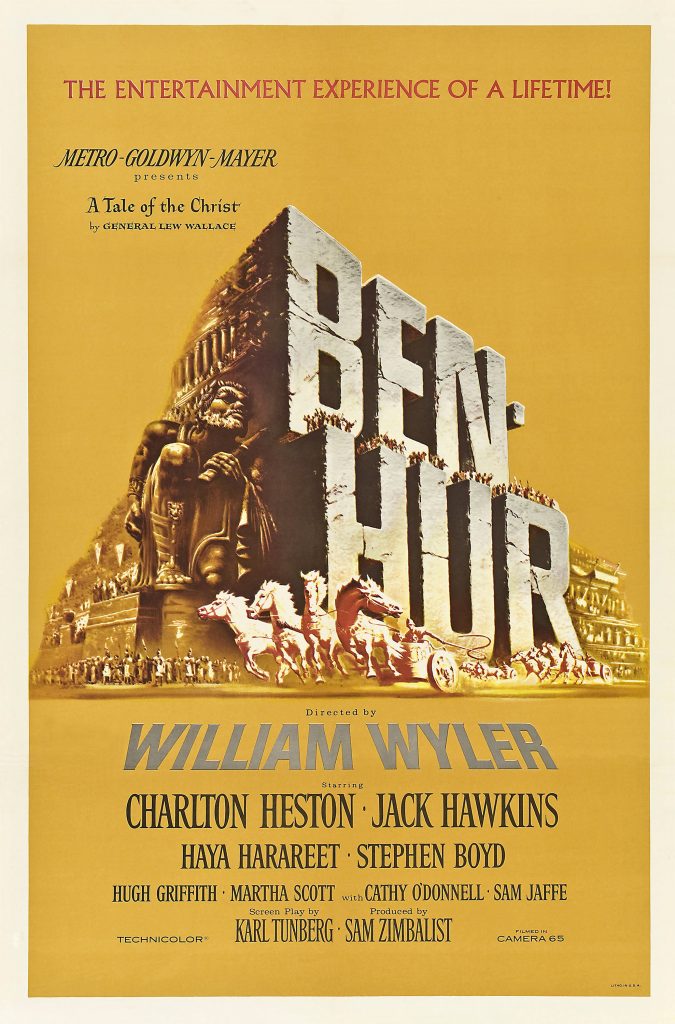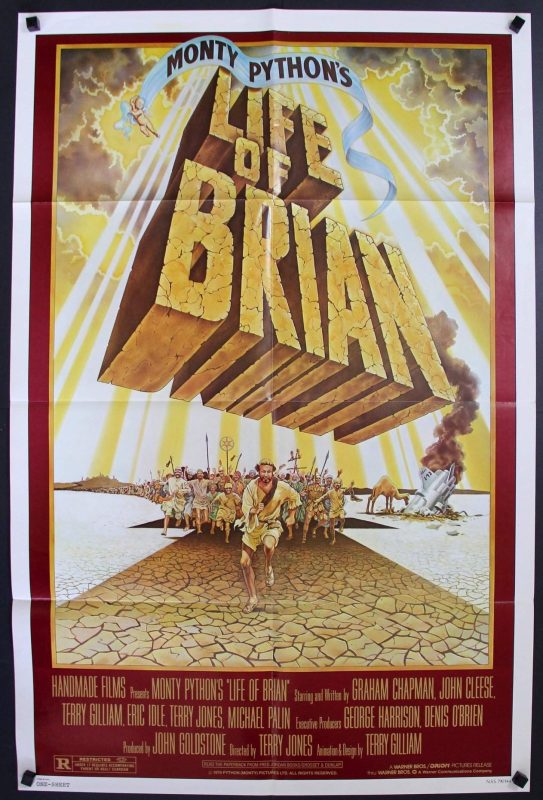It’s likely that parts of the Bible were intended to be humorous. Jonah’s travails are comically over-the-top; so’s his reaction when God spares the city at the end (“I’ve been through so much! Can’t you just kill some people, please?”). Saul’s pursuit of David is like a Wile E Coyote and Roadrunner chase. Even Jesus’s teachings have something of the tenor of George Carlin rants (and they’re illustrated with cute, memorable images, like planks stuck in eyes and camels trying to squeeze through the eyes of needles).
Whether it’s divinely inspired or not, the Bible wasn’t written by unfeeling robots or for unfeeling robots. It shouldn’t be sacrilege to wonder if we were supposed to smile at some of this stuff.
Life of Brian was the most heavily-banned movie of 1979 (with Caligula as competition, that’s saying something). Everyone from Mary Whitehouse to Malcolm Muggeridge lined up to participate in its honor-killing. Unfortunately for them, it might be truer to the Bible’s original spirit than we think.
The story follows the perpetually unlucky Brian Cohen (Graham Chapman), born on the same night and in the stable next door to Jesus. As he grows to adulthood, he is continually mistaken for the Messiah. The fact is, people need a savior, and he might have to fulfill that role whether he wants to or not.
The movie contains some fantastic scenes, and some of the strongest sustained performances the Pythons ever gave. Chapman spends the movie being politely baffled and indignant. Terry Gilliam is a slimy creep (he also plays roles in this movie, harr-de-harr). John Cleese is in full shouty bully mode. The set design (by Gilliam, I believe) is fantastic, and the country of Tunisia does its usual job in making everything look rough and sand-blasted.
Is the film really a satire of religion? In a common piece of Python lore, they attempted to dodge bans in Finland by claiming it was a parody of Golden Age Hollywood epics by DeMille, Mankiewicz, Kubrick, and so on. But that might actually be true! There’s a Spartacus parody, a Ben Hur parody, a gladiatorial battle that anticlimactically ends with a man having a heart attack, and more. The religious commentary is kind of incidental: the film’s true satirical target is the sword and sandals epics from a generation previously. The poster kind of goes mask-off.

These films were grand and stirring, but often very, very bloated (a critic described Ben Hur as making him feel “…like a motorist trapped at a railroad crossing while a long freight train slowly trundles by”) as well as artistically dubious (Roger Ebert referred to them as “big-budget B pictures”). In short, they offer a target for satirists that’s a mile wide. Caligula does the same thing in a different way: reimagining the glories of the Hollywood epics, just with the depravity and boy-sex left in. So there’s blasphemy here, but it’s directed more at Cecil B DeMille than at Christianity or Judaism.
Viewed as religious commentary, Life of Brian is halfhearted. The Pythons were Oxbridge unbelievers with little time for faith, and you have to really love something to know where to stab it to death.
They ask the same questions a lot of skeptics ask: how do we know Jesus really said all those things? Fair point: he spoke to 5,000 people at Bethesda without a microphone or amplification. If you were in the nosebleed seats, you probably couldn’t hear shit. But it’s the kind of commentary you make when you’re an outsider looking in on a world you don’t fully understand.
But I’m fine with that, because the Pythons had many other areas to fall back to. Such as mocking squabbling alphabet-soup revolutionary organizations. Or skewering the British educational system (there’s a great scene where John Cleese catches Graham Chapman graffiti’ing a wall with incorrect Latin, and forces him to write 100 lines on the walls as punishment).
The movie is flawed, and is less funny than Monty Python and the Holy Grail. Most of the good scenes and quotable lines (“blessed are the cheesemakers”, “what have the Romans ever done for us?”) are piled into the first half, leaving the movie’s latter half a bit of a barren desert. Basically, as soon as the aliens abduct Brian, the film becomes a chore.
Pythonesque comedy is notoriously hard to analyse. They sometimes try for jokes that simply do not work, and I’m at a loss to explain why. In the jail, Brian encounters a mistreated prisoner (played by Michael Palin) who’s developed Stockholm syndrome. The character doesn’t make any sense, and his nails-on-a-chalkboard screeching makes you suspect that John Cleese’s “shut up!” might be ad-libbed.
The movie feels longer than it is. All the scenes involving gourds and sandals and haggling are just boring and skipworthy. Again, this is a classic Monty Python writing trick: taking something absurdly small (like a character’s inability to pronounce “R”) and then exaggerating it until the film’s reality threatens to collapse around the thing’s sheer mass. But sometimes the trick works and sometimes it doesn’t. In this case, we get a lot of scenes where the end result is you’re saying “Alright, I get it. He can’t say R. Please move on.”
Miraculously, it does. Life of Brian regains its footing in its final scenes, and manages to be amusing and tragic. It really does capture the same frustrated, frustrating divine absurdity of the Jonah story. Brian is not the messiah, but he still suffers the fate of one. It might all be God’s plan, but His ways are not like our ways, and to Brian it simply appears cruel and random. He has at least five or six opportunities to walk free, but they all fail, for extremely stupid reasons. Here, as nowhere else, the Pythons are touching on something existential and profound.
I remember reading about Chris Gueffroy, an East German citizen who hatched a daring plot to cross the Berlin Wall. The Schießbefehl (or order to shoot on sight) was nominally still in effect, but Gueffroy did not believe he would actually be fired upon. On the 5th of February, 1989, he entered the Britz canal district, and tried to scale the metal lattice. On the last climb, he was spotted by a NVA border patrol and shot to death. The irony was that the wall was torn down just a few months later – Gueffroy could have walked into West Germany if he’d merely waited!
Is that story tragic? Yes. But is it also funny? Yes. However our own death comes, there will probably be an element of absurdity to it, and maybe we’ll even laugh at it. One of the worst mistakes you can make with fiction (and life) is to collapse it to a single mood, a single tone. There are no comedies or tragedies; life is a multiform jewel, glaring contradiction out of every facet. Life of Brian isn’t always a great movie, but in the moments when it is, it juxtaposes pathos with humor. Life’s a piece of shit, when you look at it. Life’s a laugh and death’s a joke, it’s true. You’ll see it’s all a show, keep ’em laughing as you go. Just remember that the last laugh is on you.
No Comments »
Comments are moderated and may take up to 24 hours to appear.
No comments yet.

